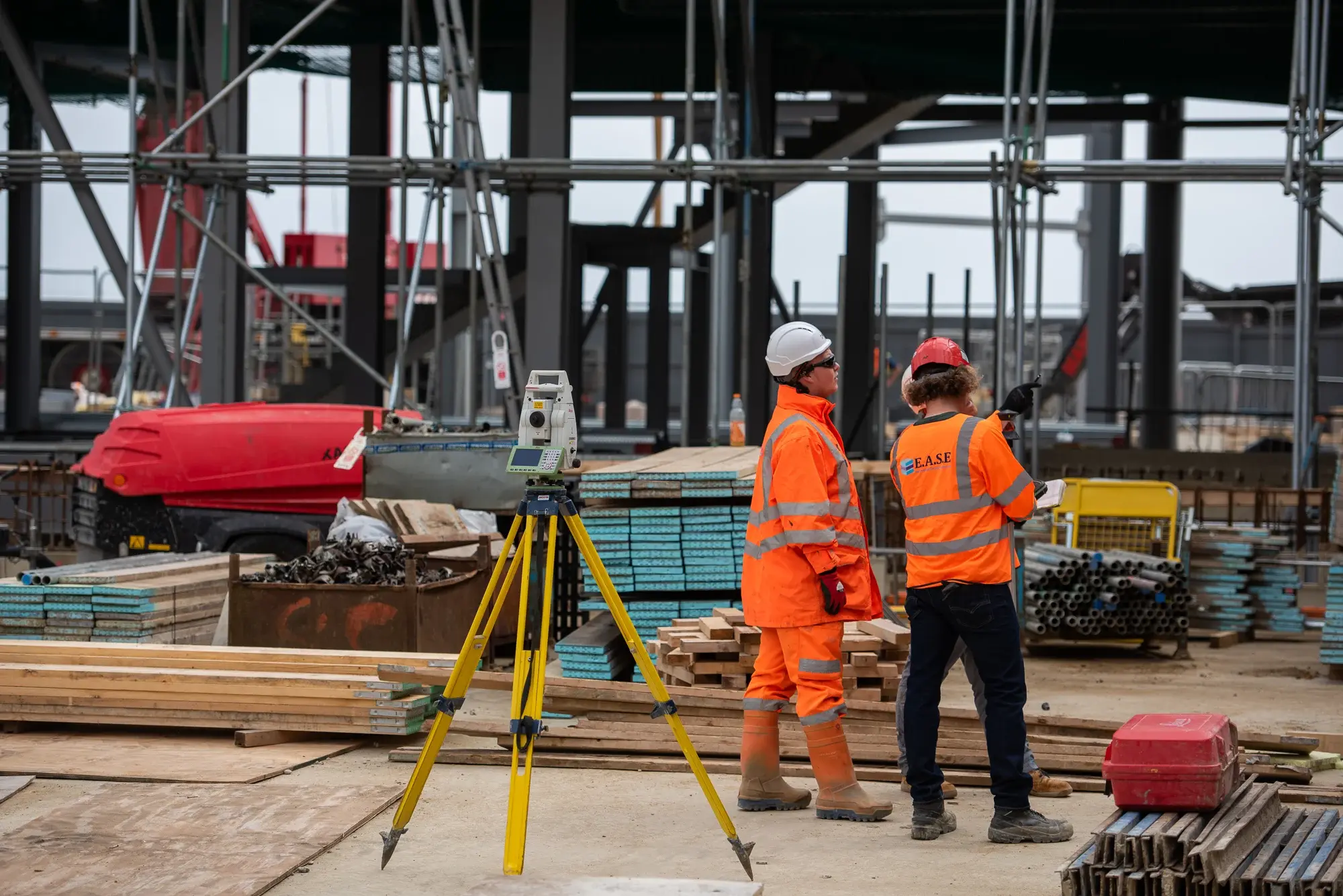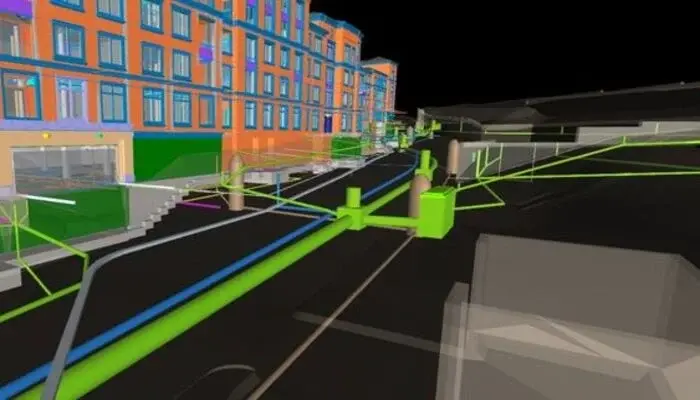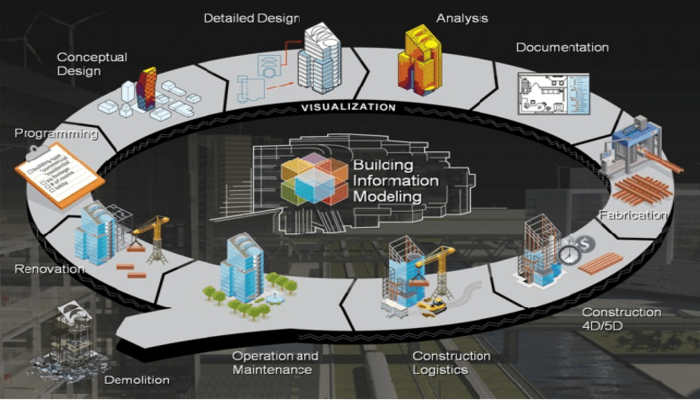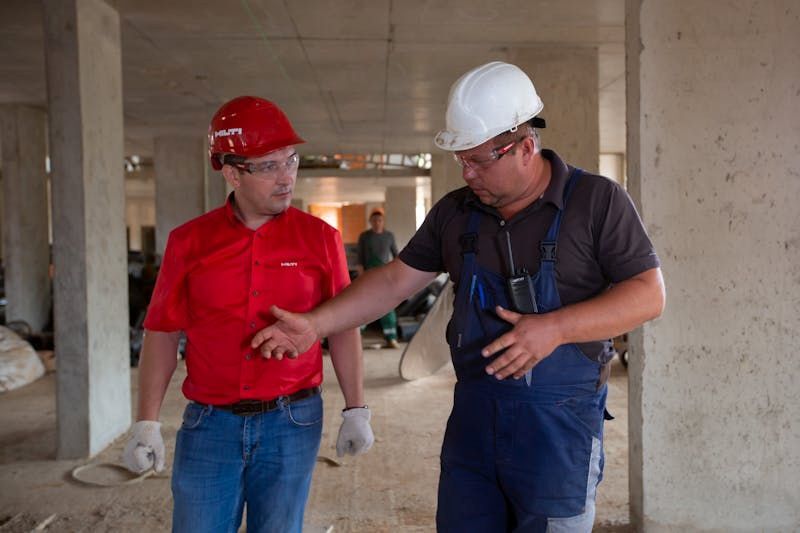
Site engineers are essential to the success of construction projects, acting as the bridge between planning and execution. They supervise day-to-day site activities, ensure safety, and maintain quality while keeping projects on time and within budget. With the right skills and knowledge, site engineers play a pivotal role in shaping infrastructure worldwide.
What is Site Engineering?
Site engineering is a branch of civil engineering – associated with planning, designing, and managing various elements in construction and infrastructure projects. Site engineers are responsible for completing projects effectively, safely, and in compliance with every applicable regulation. The construction industry is highly dependent on their role as they contribute to overall project success in several ways. Site planners and designers also depend heavily on on-site engineers who assess topography, soil conditions, and environmental factors to determine optimal layouts for buildings, roads, utilities, and other structures. They check that infrastructure development meets design requirements, security standards, and project budgets. Their work is centred around quality control and environmental compliance, with them conducting inspections and ensuring that construction activities fit within the lines of environmental regulations.
Site engineers are responsible for ensuring safety, managing budgets and schedules, and adapting resources as necessary. Several construction projects call for site engineers, which include building construction, road and highway projects, land development, environmental initiatives, infrastructure projects, and industrial facilities. They use their expertise to maintain the quality, safety, and efficiency of all the construction activities pertinent to the project. The collaboration between site engineers, architects, contractors, and authorities to achieve project goals is what makes site engineers indispensable in completing construction and infrastructure projects.
What Does a Site Engineer Do?
Site engineers are key to the successful execution of construction projects, ensuring efficient, safe, and regulatory compliance. They work with the site management team to organise, oversee, and manage on-site activities. These include elements related to building construction, environmental initiatives and industrial facilities. Also, they provide technical advice and guidance to the construction crew as necessary.
Site Engineer Duties: Roles and Responsibilities
A site engineer's duties and responsibilities include managing parts of construction projects, undertaking surveys, and overseeing overall construction work. Mentioned below is a detailed list of site engineer responsibilities on a day-to-day basis.
- The primary responsibility of the site engineer is to supervise the original layout and design of the construction site
- For the successful design implementation, they evaluate topography, soil conditions, drainage, and environmental considerations.
- They plan and manage the building with essential infrastructure components such as water supply, sewage, stormwater drainage, and utility networks.
- On-site engineers guarantee design specifications, safety regulations, and project timelines.
- In addition, they manage the construction teams, subcontractors, and equipment on the site.
- They perform quality assurance tests to guarantee that the materials and workmanship meet the required standards.
- Identifying technical issues and resolving them in a timely manner is another responsibility on their shoulders.
- They also provide technical advice and ensure seamless collaboration with clients, construction crews, and other stakeholders.
Where Do Site Engineers Work?
Site engineers work in various sectors and are employed by a range of companies involved in construction and infrastructure development. They can be found working in:
- Construction Firms: Companies specialising in construction projects, including building construction, road and highway development, and infrastructure projects.
- Civil Engineering Companies: Firms that focus on civil engineering and site development services, providing expertise in planning, design, and construction oversight.
- Consulting Firms: Engineering consulting firms that offer services related to site engineering, project management, and construction supervision.
- Government Agencies: Departments responsible for public works, transportation, urban planning, and environmental initiatives often employ site engineers.
- Real Estate Development Companies: Companies involved in land development, residential or commercial property development, and industrial park projects.
Site engineers may work with companies like AECOM, Jacobs Engineering Group, Bechtel Corporation, Turner Construction, and Skanska, among many others. These firms take on large-scale building, engineering, and infrastructure projects that necessitate the experience of site engineers to ensure effective design, implementation, and completion.
Read More: Top 5 Civil Engineering Design Courses in India
What Skills Are Required to Become a Successful Site Engineer?
A site engineer handles multiple responsibilities encompassing supervising site work, checking design plans, coordinating material deliveries, tracking progressing and maintaining records. Having relevant skills ensures that they are able to perform their duties proficiently.
A good site engineer blends technical knowledge with management and communication skills. Key skills include:
- Civil engineering degree or equivalent
- Proficiency in AutoCAD and project management tools
- Knowledge of safety standards and quality control
Leadership, clear communication, and teamwork abilities
Mentioned below is the list of site engineer skills that they must possess:
|
Skills |
Description |
|
Educational Background |
Bachelor's degree in Civil Engineering or a related field |
|
Technical Expertise |
Proficiency in blueprints, construction techniques, and structural engineering |
|
Software Proficiencies |
Expertise in project management tools like Microsoft Projects and CAD software like AutoCAD |
|
Project Management |
Skilled in planning, budgeting, scheduling, and resource management |
|
Quality Control |
Ability to inspect work, ensure quality, and meet industry standards |
|
Safety Awareness |
Knowledge of construction safety protocols for a safe working environment |
|
Communication Skills |
Effective written and verbal communication for collaboration with teams and stakeholders |
|
Problem-solving |
Strong problem-solving skills for addressing construction challenges |
|
Adaptability |
Capacity to adapt to changing project conditions and site challenges |
|
Leadership |
Leadership qualities for effective team management |
How Can I Become a Good Site Engineer?
-
Earn a bachelor’s degree in civil engineering or related fields.
-
Gain hands-on experience through internships.
-
Develop software proficiency in BIM tools and AutoCAD.
-
Stay updated with building codes and sustainability practices.
-
Pursue certifications like PMP or LEED for career growth.
Additional Skills and Requirements
- Committed to continuous learning to stay updated with the latest construction methods, technologies, and industry standards.
- Knowledge of local building codes, permits, and regulations to ensure projects adhere to legal requirements.
- Ability to identify and mitigate potential risks and issues during construction.
- Understand environmental regulations and practices, including sustainability and eco-friendly construction methods.
- Proficiency in estimating project costs and managing budgets effectively.
- Strong interpersonal skills for maintaining positive client relationships and addressing their concerns.
Related Read: 7 Best Online Courses To Upskills as a Site Engineer
How Can Novatr Help You?
In today's digital environment, it’s important to have a deeper understanding of technological skills. Building Information Modelling (BIM) has transformed the worldwide Architecture, Engineering and Construction (AEC) businesses, sparking innovation and revolutionising design and work processes.
Novatr offers a comprehensive 8-month BIM Professional Course for Civil Engineers. It is designed and structured to help you lead your civil engineering career with confidence. The flexible curriculum includes a range of engaging weekly live sessions, close mentor interactions, and a challenging capstone project. This cutting-edge course allows you to learn alongside a motivated, diverse group of international engineers to become proficient in all essential BIM tools and workflows, enabling you to create detailed, accurate, and efficient designs.
Also Read: Using BIM in Civil Engineering | Everything You Need to Know
Difference Between a Site Engineer and a Project Engineer
While site engineers excel in site-specific, technical, and hands-on aspects of construction, project engineers oversee the entire project from concept to completion and engage with multiple stakeholders. We have made a comparison between the roles of a site engineer and a project engineer in the following table to help you understand better:
|
Aspects |
Site Engineer |
Project Engineer |
|
Roles |
Concentrates on activities that require on-site coordination and execution |
Leads the project from start to finish |
|
Responsibilities |
Supervises the construction of the site, makes sure it adheres to design and safety standards, oversees quality control, and oversees workers and equipment |
Supervises every aspect of the project, including planning, budgeting, scheduling, procurement, and coordination of multiple aspects |
|
Scope |
The scope of work is limited to the construction site |
The scope of extends to the entire project and frequently multiple sites or projects |
|
Decision-Making |
Ensures on-site decisions regarding construction processes are made |
Ensures project-wide decisions that involve strategic planning |
|
Interaction |
Works with on-site teams and subcontractors |
Engages with diverse parties, such as clients, architects, regulatory authorities, and contractors |
|
Hands-On Involvement |
Hands-on and technical approach to on-site involvement |
Hands-on work that is moderate to low, with a focus on project management and coordination |
|
Project Management |
Concentrates on the daily operations and technical aspects |
Concentrates on strategic planning, organisation, and project-wide management |
What is the Average Salary of a Site Engineer in India?
Understanding the average salaries for site engineers is crucial for both freshers and seasoned professionals. Site engineers' salaries vary from one country to another and are largely influenced by experience levels. To help get a better understanding, we have collated average salaries for site engineers by country and experience level in the following table:
Average Salaries For Site Engineers at Entry Level
|
Country |
Average Salary (Local Currency) |
Median Salary (Local Currency) |
Source of Information |
|
India |
₹400,000 - ₹600,000 |
₹450,000 |
Payscale, Glassdoor |
|
UK |
£25,000 - £35,000 |
£30,000 |
National Careers Service |
|
USA |
$50,000 - $70,000 |
$60,000 |
Bureau of Labor Statistics |
|
Dubai |
AED 60,000 - AED 80,000 |
AED 70,000 |
GulfTalent |
|
Germany |
€40,000 - €50,000 |
€45,000 |
Payscale |
|
France |
€35,000 - €45,000 |
€40,000 |
Glassdoor |
|
Canada |
CAD 50,000 - CAD 70,000 |
CAD 60,000 |
Payscale, Indeed |
|
Singapore |
SGD 40,000 - SGD 60,000 |
SGD 50,000 |
Glassdoor, JobStreet |
|
UAE |
AED 60,000 - AED 80,000 |
AED 70,000 |
GulfTalent |
Entry-level salary in India typically ranges around ₹15K - ₹23K/mo, while experienced engineers often earn ₹30K - ₹50K/mo.
Globally, salaries vary:
- UK: £31K - £46K/yr
- USA: $79K - $137K/yr
- UAE/Dubai: AED 4K–9K/mo
- Canada: CAD 57K–106K
This shows strong earning potential for those who grow within the industry.
Average Salaries For Site Engineers With 10+ Years Of Experience
|
Country |
Average Salary (Local Currency) |
Median Salary (Local Currency) |
Source of Information |
|
India |
₹800,000 - ₹1,200,000 |
₹950,000 |
Payscale, Glassdoor |
|
UK |
£45,000 - £60,000 |
£50,000 |
National Careers Service |
|
USA |
$80,000 - $100,000 |
$90,000 |
Bureau of Labor Statistics |
|
Dubai |
AED 100,000 - AED 140,000 |
AED 120,000 |
GulfTalent |
|
Germany |
€60,000 - €75,000 |
€70,000 |
Payscale |
|
France |
€50,000 - €65,000 |
€60,000 |
Glassdoor |
|
Canada |
CAD 80,000 - CAD 100,000 |
CAD 90,000 |
Payscale, Indeed |
|
Singapore |
SGD 60,000 - SGD 80,000 |
SGD 70,000 |
Glassdoor, JobStreet |
|
UAE |
AED 100,000 - AED 140,000 |
AED 120,000 |
GulfTalent |
Career Path of a Site Engineer
Site engineers are vital figures in the construction industry, overseeing construction projects to ensure timely completion, budget compliance, and quality standards. Their career progression varies based on their progress, project complexity, and regional opportunities. Continuous learning, networking, and staying updated with industry trends are crucial to succeed as a site engineer. A detailed career path for site engineers over 15 years is provided.
Also Read: Using BIM in Civil Engineering | Everything You Need to Know
Educational Path
- Bachelor's Degree (4 years): A bachelor's degree in civil engineering (B.tech in civil) or any other equivalent discipline, such as structural engineering, construction management, geotechnical engineering, or project management, is required to become a site engineer.
- Internships (1-2 years): After completing a degree, it is critical to gain site experience by working with construction or engineering firms. This will give you valuable practical experience and help establish a network within the industry.
Entry-Level (0-3 years)
Assistant Site Engineer: After graduation, you may start as an Assistant Site Engineer. Here you’ll get the opportunity to work closely with senior engineers, learn about construction processes, and assist them with site inspections and documentation.
Mid-Level (4-8 years)
- Site Engineer: You can advance to the position of site engineer after a few years of experience. You'll be in charge of independently managing smaller projects, such as supervising construction activities, collaborating with subcontractors, and guaranteeing safety and quality standards.
- Senior Site Engineer: As an experienced senior site engineer, you will plan, budget, and manage complicated projects and teams, developing your project management abilities and knowledge.
Advanced (9-15 years)
- Project Manager: As a project manager, you will manage project planning, budget management, team leadership, and client communication to ensure successful project completion.
- Construction Manager: Construction managers oversee multiple construction projects alongside site engineers and project managers to ensure efficient operations, quality, and safety standards.
- Specialisations: Specialising in subjects such as structural engineering, geotechnical engineering, or sustainable building opens up new career prospects and higher-paying work jobs.
Certifications and Professional Development
Consider earning appropriate qualifications such as Professional Engineer (PE) Licencing, Project Management Professional (PMP), or Leadership in Energy and Environmental Design (LEED) certification during your career. These certificates can help you advance your site engineer skills, qualifications and professional opportunities, paving way for growth in your career.
Key Skills and Qualities
- Strong technical and engineering expertise
- Capabilities for managing projects
- Problem-solving abilities
- Ability to communicate and lead effectively
- Understanding construction regulations and safety standards
- Skilled in working collaboratively with teams and contractors
Conclusion
A site engineer is the backbone of construction projects, ensuring safe, efficient, and high-quality delivery. With the right skills and certifications, this career offers strong global opportunities.
If you’re looking to advance your career, explore Novatr’s BIM Professional Course for civil engineers. It covers advanced digital workflows and real-world applications to help you excel. Learn more on our resource page.
Frequently Asked Questions:
1. What are the main responsibilities of a site engineer?
Supervising construction, ensuring safety, quality control, and managing crews and subcontractors.
2. What skills are required to become a site engineer?
Technical expertise, project management, software proficiency, safety knowledge, and leadership.
3. What is the salary of a site engineer in India?
Entry-level engineers earn ₹15K - ₹23K/mo; experienced professionals earn ₹30K - ₹50K/mo.
4. How can I become a site engineer?
Get a civil engineering degree, gain site experience, master tools like AutoCAD and BIM, and pursue certifications.
Was this content helpful to you



-1.png)







